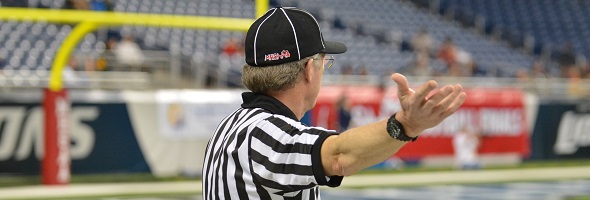
Be the Referee: Concussion Protocol
September 4, 2014
This week, MHSAA assistant director Mark Uyl explains the football official's role in making school personnel aware that an athlete may have sustained a concussion.
"Be the Referee" is designed to help educate people on the rules of different sports, to help them better understand the art of officiating and to recruit officials. The segment can be heard on Mondays, Wednesdays and Fridays during the school year on The Drive With Jack Ebling on WVFN-AM, East Lansing.
Below is this week's segment - Concussions - Listen
Today we are going to talk about concussions. It is important to know that a game official will never make a diagnosis of whether or not an athlete has suffered a concussion. However, those game officials do have an important role to play when it comes to keeping athletes safe.
Officials must be not only aware during the play but especially just after the play for any athlete that appears to be disoriented, unsteady on their feet, or even appears dizzy to where the game must be stopped immediately, the coaching staff notified and then officials need to allow the coaches, working with the school's medical personnel, to make the best decision for the athlete involved.
Past editions
Aug. 25 - Targeting - Listen

Be the Referee: More Injury Time
November 26, 2019
This week, MHSAA officials coordinator Sam Davis discusses a change to the wrestling injury time rule to allow for more time to evaluate head and neck injuries.
Be The Referee is a series of short messages designed to help educate people on the rules of different sports, to help them better understand the art of officiating, and to recruit officials.
Below is this week's segment - More Injury Time - Listen
A new rule in wrestling for the upcoming season allows for additional time to evaluate head and neck injuries.
If an injury occurs involving the head, neck, cervical column and/or nervous system and an appropriate health care professional is present, that caregiver may request the traditional 90 seconds of injury time be extended up to a maximum of five minutes to evaluate the injury. Before that time expires, the wrestler must be ready and able to continue the match or it will be defaulted.
Absent the presence of an appropriate health care professional, all head and neck injuries are subject to the traditional 90 seconds of injury time.
Under the new rule, it is not up to the official to determine if additional time is needed – that is the call of the appropriate health care professional.
Past editions
Nov. 21: Football Review - Listen
Nov. 14: Sideline Safety - Listen
Nov. 7: Officials Playlist - Listen
Oct. 31: Most Important Line - Listen
Oct. 24: Automatic 1st Downs - Listen
Oct. 17: Catch Momentum - Listen
Oct. 10: Golf Rules Changes - Listen
Oct. 3: No Tackle Box - Listen
Sept. 26: You Make the Overtime Call - Listen
Sept. 19: Swimming Finishing Touch - Listen
Sept. 12: Curbing Gamesmanship By Substitution - Listen
Sept. 5: Football Safety Rules Changes - Listen
Aug. 29: 40-Second Play Clock - Listen

